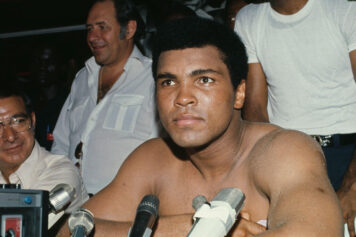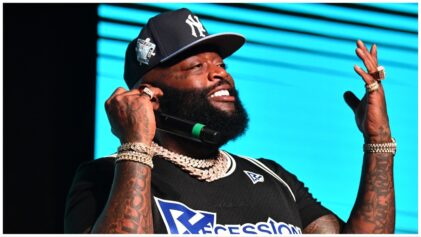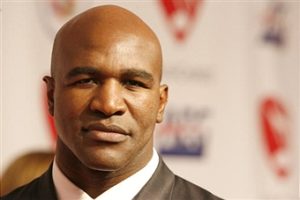
“Boxing chooses who boxing wants to win,” Holyfield said. “That’s just how it is.
“Generally, it’s a pick ‘em fight,” he added. “But if they want Floyd to win, he’ll win. If they want Manny to win, he’ll win.”
Holyfield said Mayweather likely is considering the unseemly side of boxing in his decision to fight Pacquiao, a match much of the boxing world has craved for several years.
“I don’t think it’s too late,” Holyfield, 52, said. “It’s two guys who take care of themselves. If you want to know about Mayweather, he takes care of his body, even though he’s a night owl…Pacquiao, he really doesn’t have anything to lose. Floyd is the one who has everything to lose because he doesn’t want to lose. When you’ve already lost, what difference does it make? But Floyd wants to be undefeated (for his career). Now it comes down to if he’s going to risk it all for this one (fight).
“It’s a big risk because you know what the game of boxing is. The game of boxing is one of those things where if they don’t want Mayweather to win they just won’t give it to him. He realizes that. And (then his) record is gone down the drain. I don’t think he’s afraid. He recognizes that in boxing, people do what they want to do. And they just say, ‘You lost.’ They cheat people. Who hasn’t been cheated (in boxing)?”
Holyfield did not specify who would determine the winner and how they would assure that fighter would be the victor. But he pointed to fights in history, including his own 2001 12-round decision loss to John Ruiz, as an example.
“It was kinda sad when it came down to fighting Ruiz that the promoter can think, ‘Oh, if we had a Spanish-speaking heavyweight, what would we do?’ They found out (people) didn’t like him because they like winners. . . When it comes down to boxing, (fans) don’t want a fluke. They don’t want somebody who really can’t fight, somebody you know is gonna get tore up. And that’s what (Ruiz) did. When he got there, Roy Jones (a blown up light-heavyweight) beat him. It shows you that a little guy like (beat him) that that they didn’t have the right guy. But they opened the door for him (to be champ with the controversial decision). Then (Ruiz) found out he couldn’t fight on that level and he didn’t want to fight anymore.”
To further his point, Holyfield brought up Larry Holmes, who was cruising along undefeated in his career until he said in an interview that Rocky Marciano “couldn’t hold my jock.”
“Larry Holmes was gonna break that record,” Holyfield said, “but they took it from him. Nobody said nothing because it was a Black (man), because it was (Michael) Spinks who won. Spinks didn’t beat him. But they gave it to him. They made up an excuse that (Holmes) shouldn’t have said (anything) about Rocky Marciano.
“I’m sure Floyd thinks about it: Shoot, man, these people (in boxing) do anything they want to do. So he’s thinking, ‘Do I want to risk $100 million for them to take (the decision) away from me?’”
In a straight up fight with no outside influences, Holyfield seemed to lean toward Mayweather, but only if “he fights 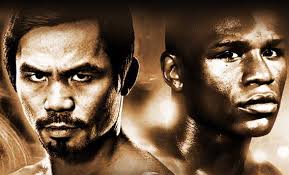
“I think it will happen. It’s a matter of money,” Holyfield, the only four-time heavyweight champion in boxing history, said. “They’ve waited a long time. They need to do it before somebody just gives up on it. I heard they offered Floyd $100 million. People talk.
“Whoever fights their fight will win. If Floyd boxes and is able to box the whole time and Manny can’t trap him, Floyd will win. If Manny is able to corner him and with the angle Manny throws punches, it would be a difficult fight.
“But I saw Floyd fight Sugar Shane Mosley. He hurt Floyd, and Floyd stopped moving and banged him up. So it’s obvious Floyd hits harder than people give him credit. I’ve never seen anyone try to run through Floyd. On Manny side, he’s gonna be all right (even if he loses). All he’s gonna do is grin and say, ‘I gave my all.’ Manny’s gonna fight hard if they (paid) him nothing. And he won’t make no excuses. And people who don’t make no excuses are the ones who can bounce back.”
During the 30-minute interview, Holyfield touched on a number of subjects. Among them:
Why boxing is not a sport of the youth: “There isn’t much for them to watch. I’m glad NBC is going to do boxing on free TV soon. But if you don’t see the fights, then there is no one for kids to look at and want to go to the gym. We have to put amateur boxing on TV and let kids see it for free and you’ll have more kids realizing this is a sport that can allow you to be a champion. . . For me, being a kid from the ghetto, seeing boxing on Wide World of Sports, I said, ‘Shoot, I can get on TV.’ At that time, in ’76, there was Leon Spinks and Michael Spinks. And they came from the ghetto and they didn’t talk correctly and so I could see myself in them. When both of the Spinks won gold medals, well, I said I could try to find my place in boxing and fit it. It’s just amazing that when you find somebody out there and you think your life is just as good as theirs, you can believe that you can achieve what they achieved.”
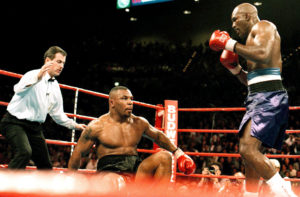
His life now: “I have a luxury life. I don’t fight. (He laughs.) I travel the world speaking. People ask me how I became who I am. And I tell them. I’m not punch drunk, and they want to know why I’m not. So I give my testimony on how good God was to me, not so much how good I was. Also, I speak to a lot of Black males about getting checked out. Many Black men don’t want to go to the doctor to get tested for stuff like colon cancer so you can be all right for your golden years. Out of the country, a lot of people want to hear something as simple as, ‘If it wasn’t for my momma, I wouldn’t be where I am.’ They like those type of stories. . . I make about a million (dollars) speaking. . . And it’s a great thing.”
